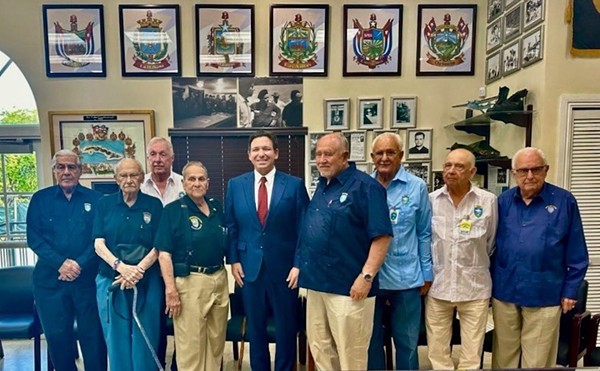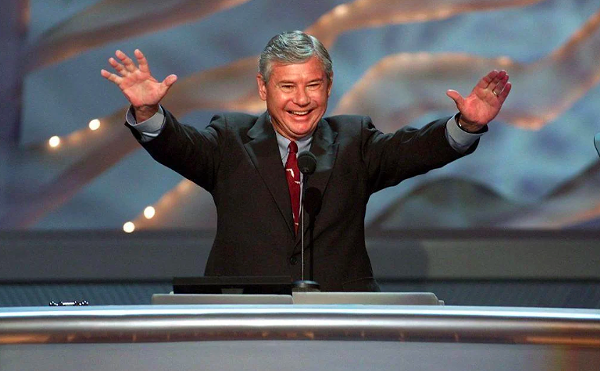Jack Abramoff may not have distinguished himself during his stint as a Hollywood B-movie producer, but even he would have had the sense not to pass up a story this good.
Abramoff was a superstar lobbyist in Washington, D.C., with deep ties in the Republican hierarchy stretching back 23 years to his days as the chairman of the College Republicans. He was a "Ranger" for President Bush, raising more than $100,000 for last year's campaign. His list of close friends and colleagues reads like a Neo-Con Who's Who: Tom DeLay, Ralph Reed, Grover Norquist. You get the idea.
Abramoff had access at the highest levels of government and made millions of dollars in fees because of it. His nom de guerre? "Casino Jack," because of his lucrative contracts with American Indian casinos.
That was before he and an associate, Michael Scanlon of Scanlon Gould Public Affairs (a former spokesman for House Majority Leader DeLay), were placed at the center of a federal grand jury probe into the way both handled their tribal clients. And his tale could become a cautionary one for Florida, which is arguing over expanding casino gambling and whether to require lobbyists to disclose how much they make from their clients.
Abramoff and Scanlon have not been charged with a crime, but their Indian tribe clients claim that the duo bilked them out of more than $66 million. Their case, at least in the public eye, has not been helped by e-mails in which Abramoff writes such statements as, "The key is managing them to think they got a victory and the money was worth it", "Am I reading this wrong, or do I smell a hell of a lot more money if we spin this right?" and "These mofos are the stupidest idiots in the land for sure."
The worst abuse came in Texas.
In 2003, Abramoff already boasted a good list of Indian tribes as clients when he apparently set his sights on the Tigua tribe of El Paso, Texas, which was operating a full-fledged casino in violation of state law.
According to hundreds of pages of e-mails he sent and received (and released to the public as part of the ongoing Congressional investigation), Abramoff recruited one of his former College Republican interns, Ralph Reed, to help organize a grassroots effort to pressure the Texas attorney general to shut down illegal casinos in that state. Reed is the former executive director of the Christian Coalition and was President Bush's 2004 Southeast Regional campaign director.
Once they were successful, Abramoff and Scanlon convinced the Tigua tribe to hire them to restore their right to operate Speaking Rock Casino (though the duo, unbeknownst to the tribe, had just played a big role in closing the casino down). In a memo outlining "Operation Open Doors," they touted a full-court press of political pressure and influence and public relations effort. The price tag? $5.4 million.
Remarkably, the tribe agreed to $4.2 million of that. Shortly afterward, tribal consultant Marc Schwartz included Abramoff's e-mail address in a group e-mail that he sent out updating the tribe's situation. Abramoff, in an e-mail to Scanlon, hit the roof:
"That fucking idiot put my name on an email list! What a fucking moron. He may have blown our cover!! Dammit. We are moving forward anyway and taking their fucking money."
Abramoff then went looking for willing Congressmen to insert language into a bill that would allow the casino to reopen. He and Scanlon had realized the financial potential of Indian tribes, some of them unsophisticated in their federal dealings, and the hundreds of millions of dollars their casinos generate. In December 2002, Abramoff wrote to Scanlon after reading a New York Times article that revealed 27 tribes make more than $100 million a year from gaming:
"We are missing the boat. There are a ton of potential opportunities out there. We need to get moving on them."
Switching to Florida… We have two major Indian tribes here, the Seminoles and Miccosukees. Both employ teams of lobbyists to represent their interests in government. Nothing wrong with that. Both operate casinos, although they are the Class II variety, which means they are limited to lower-stakes poker tables, lower-payout video gaming machines and bingo, for the most part. Nothing wrong with that. Both spend lots of money - legally - in the political process, more than $6 million by the Seminoles from 1996 to 2004 and $680,000 by the Miccosukees in state elections during that time.
There is no whiff of scandal surrounding Florida's Indian tribes and their gambling. I know at least one of their lobbyists, Mike Abrams of Miami, from my days in politics and know he is entirely above board.
But two issues at play in the Florida legislature could influence whether we, too, become a breeding ground for Jack Abramoffs.
First, lawmakers are trying to define what kind of slot machines four Broward County parimutuels (harness racing, dog and horse tracks and a jai-alai fronton) are going to get after the passage of the pro-gaming Amendment 4 last year. If lawmakers let the pari-mutuels have full-blown slot machines, as they will want, it means under federal law that Indian casinos, including the Seminole Hard Rock Casino in Tampa, will be able to have them also.
This would translate to even bigger profits for the Seminoles and Miccosukees. (To give you an idea of how much we are talking about, in one Abramoff memo he puts the annual net revenues from a single California slot machine at $50,000. Just 500 of the one-armed bandits at one casino generate $25 million in revenues.)
Second is the movement to force lobbyists to disclose their fees. Senate President Tom Lee of Brandon has made transparency in lobbying a top priority. The Senate passed a lobby reform bill unanimously on April 7, but it lags in the House.
Florida is in the minority nationally in not requiring lobbyists to disclose their clients and revenues. So while we know, for instance, that the Seminole Tribe of Florida gave $205,000 to the Republican Party of Florida and spent $5.6 million fighting Amendment 4, we have no idea how much it is paying to lobby lawmakers during this session. We need to know who is paying lobbyists and how much, for far more than just Indian tribes.
The Washington Post used federal lobbying disclosures to break the Abramoff story in February 2004. Abramoff has turned to a time-worn defense in explaining his actions: Everybody's doing it.
"Mr. Abramoff is being criticized for doing what lobbyists do: making proper and legal campaign contributions and traveling with members of Congress," Andrew Blum, spokesman for Abramoff's attorney, Abbe Lowell, told the Houston Chronicle.
His supporters insist he is being demonized.
"Jack has made some mistakes," Rep. Dana Rohrabacher, R-Calif., told the Chronicle, "but he is not the dishonest, malevolent, arrogant, wheeler-dealer that people are portraying. He is a fine man."
But would a "fine man" write this?:
"From: Abramoff, Jack (Dir-DC-Gov)
"Sent: Wednesday, March 05, 2003 11:58 AM
"To: Mike Scanlon
"Subject: RE: Gone??
"Good. I think the key thing to remember with all these clients is that they are annoying, but that the annoying losers are the only ones which have this kind of money and part with it so quickly. So, we have to put up with this stuff."
Political Whore advised corporate clients on lobbying matters on occasion during his tenure as a political consultant. He never referred to them as "monkeys," but he pleads the Fifth Amendment on using the term "morons." You can reach the Po-Ho by e-mail at [email protected].
















